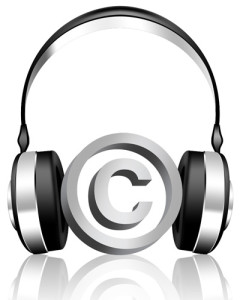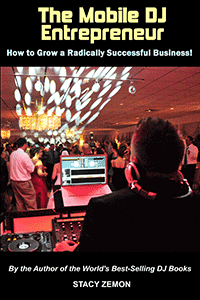
by Bob Moffett
DJs - You may reprint this article with appropriate attribution and original source link: http://proformancedj.com/
Copyright in prerecorded music is an issue revisited dozens of times by law makers in the last half-century. But not since the early days of “radio” has there been such heated debate about the boundaries. With the record labels currently poised to pounce on every test case their lawyers can devise you need to be certain you, your producers, or your disc jockey won’t be tied up in court or under a restraining order come the day of your event.
The music collection of any individual DJ may indeed be personal property but music licensing is defined on the basis of how and where the music is used or distributed. Large numbers of disc jockeys routinely skirt their responsibility. Some are ignorant of the law, but a many are just indifferent. If the latter is true, then how indifferent might they be in their commitment to your event? Every DJ trades in words like “professional” or “details.” The following look at the inside of this business will help you determine if the disc jockey you’re considering lives up to his/her language.
Most problems arise within groups of associated disc jockeys or those seeking a larger scale of operation who rely on duplicated CD’s and copied hard drives to supply multiple DJs. A disc jockey or other entertainment company that deliberately ignores copyrights is negligently placing their business, employees, and consequently your event, at risk.
Don’t be fooled by clever ruses. There are no unique licensing arrangements available to a disc jockey or entertainment company in the U.S. that would allow it to create multiple copies of its’ own recorded music libraries. Furthermore, the record labels generally do not grant permissions that compete with the wholesale and retail products already in distribution. DJs are required to purchase their music through legitimate retail/wholesale channels or licensed subscription services.
Duplication of these materials for the purpose of expanding operations is strictly prohibited. The Audio Home Recording Act which allows consumers to record a copy of a favorite song for their personal use (AHRA Section 1008) does not apply where individuals are involved in the distribution of a product to multiple users within a trade or business.
A DJ company reproducing compilations of music to distribute among it’s DJs violates the distribution rights of the copyright holders and their licensees.
Commercial Rights
The purpose of the copyright law has never been to deny consumers the portability of their music, but rather to protect the commercial rights of the people involved in the production and distribution of creative works. That includes not only the performing artist, but the engineers who record the work, the record company that manufactures the product, and the wholesale/retailer who distributes it. Any number of persons may hold a specific interest in the right to record, manufacture, or distribute these works. When a company or individual records multiple copies of selected musical works to distribute among DJs it violates the commercial rights of those who have invested in an exclusive license to that activity.
There is no unique recording or duplication license in the U.S. for mobile disc jockeys.
Recording Licenses
There is no single agency in the US able to grant a blanket license for the reproduction of sound recordings. Such a monopoly is not allowed under US federal trade law. To compile and record multiple custom DJ music collections would require the permission from each and every individual copyright holder for every song included. The Harry Fox Agency in New York is one such clearing house which specializes in this process. Obtaining the required copyright permissions is not impossible, but can be a difficult, time consuming, and potentially costly. Furthermore, it is unlikely permission would be granted a DJ to produce new recordings of music which is already published and available to the DJ through existing wholesale and retail sources. DJ companies are expected to obtain legally each copy of a musical work their operation requires.
Law Enforcement
While the risk of being caught is remote, it is not without precedent. Disc Jockeys have been caught and successfully sued for copyright damages. The law (Title 17 U.S. Code) provides for fines, imprisonment, and seizure of any or all equipment used in the production of pirated recordings. Civil law allows the copyright holders to sue for damages for infringement. In recent years a civil complaint filed by the RIAA against one Pennsylvania DJ company resulted in a settlement which kept the DJs out of jail, but left them with a bill for $250,000.00 in damages. A $10 million suit was also filed a against an Omaha DJ franchise which created it’s own unauthorized CD compilations which it distributed to it’s member DJs. That case was also settled and the DJ company - who then turned to it’s insurer for help - discovered the cold and expensive truth that illegal activity is not covered under generally liability.
You can avoid putting your event at risk by steering clear of risky DJs who aren’t in full compliance with the copyright law.
Play It Safe
For your own peace of mind avoid hiring a DJ who is ignorant or indifferent to the laws and issues applicable to his/her own trade. Hire a competent DJ with whom you can trust to deal in good faith with every aspect of their work.
You want assurance that the DJ and/or his company will still be in business come the date of your event. That won’t be the case if they’re tied up in court and they’re assets have been lost in a settlement. Since a piracy suit is unlikely to be protected under insurance, any DJ faced with a fine or settlement will have difficulty recovering from the financial strain.
Seek a DJ with mature planning and secure business conduct. Those who resort to illegal dupes generally lack sufficient capital, cash flow, and an effective business plan. They have failed to properly calculate the real dollar cost of producing multiple unauthorized compilations.
Lastly, there is no assurance with regard to the sound quality of the DJs own recordings. Even if the recording is digital the original source may be an old 45rpm, cassette, or pour quality MP3. When you know all the facts you’ll insist: “there’s nothing like the real thing.
Copyright 1990 Proformance Revised 2009 All rights reserved




